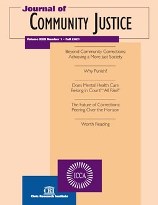Complete Issue
Author: Donad G. Evans.
Source: Volume 21, Number 02, Winter 2012 , pp.1-28(28)

< previous article |return to table of contents
Abstract:
The first article, by Carmen Long and her colleagues, recounts the process of developing the Correctional Service of Canada’s Community Corrections Strategy. Strong relationships between the government and its community partners were essential in developing this document and will be the means of fulfilling the Strategy’s goal of enhanced public safety. Dr. Frank Porporino, in this edited version of his acceptance speech upon receiving the Maud Booth Correctional Services Award from the Volunteers of America, calls us back to basics, to our humanness as we work in corrections, which is a genuine human service activity. But more than that, he issues a call to not become smug but to be more open to those we serve and to be interested in trying to understand why someone offends, rather than in being simply comfortable in trying to predict who will offend. Again,there is a call here to continue to develop the evidence base of corrections. ICCA President Sonya Spencer explores the value of an early alternative to incarceration by looking at innovative ways the model could be used to relieve crowding in federal halfway houses in Canada. This model is intended to manage and work with higher risk offenders who have been released on statutory release or are serving long-term supervision orders or with offenders who can be maintained in the community without a residential condition attached to their release order. This is an effort to find an effective means of adopting the least restrictive option as regards incarceration or other residential committal. The model could yield beneficial cost savings, especially if adopted more widely, and could create some room for managing special needs populations and parole technical violations. Community corrections professionals need to be aware of what is in the latest literature, and our capable book review editor has done an excellent job on the three books he reviews for this issue. The themes addressed are important. Restorative justice, rehabilitating sexual offenders, and reentry and transition planning are all topics critical to the front line of community corrections.Keywords: Correctional Services Canada;Justice Paradigms; Day Reporting Centers
Affiliations:
1: International Community Corrections Association.